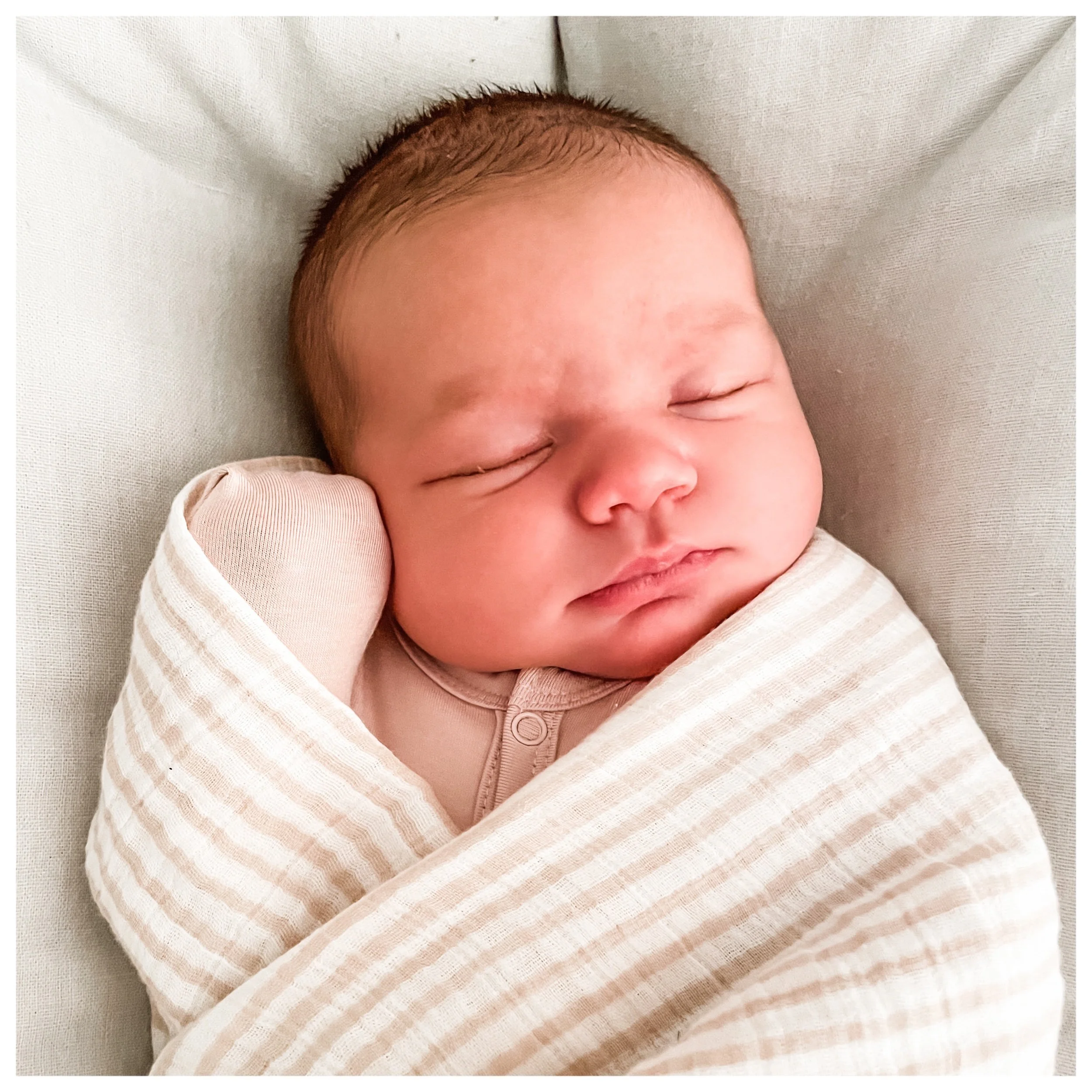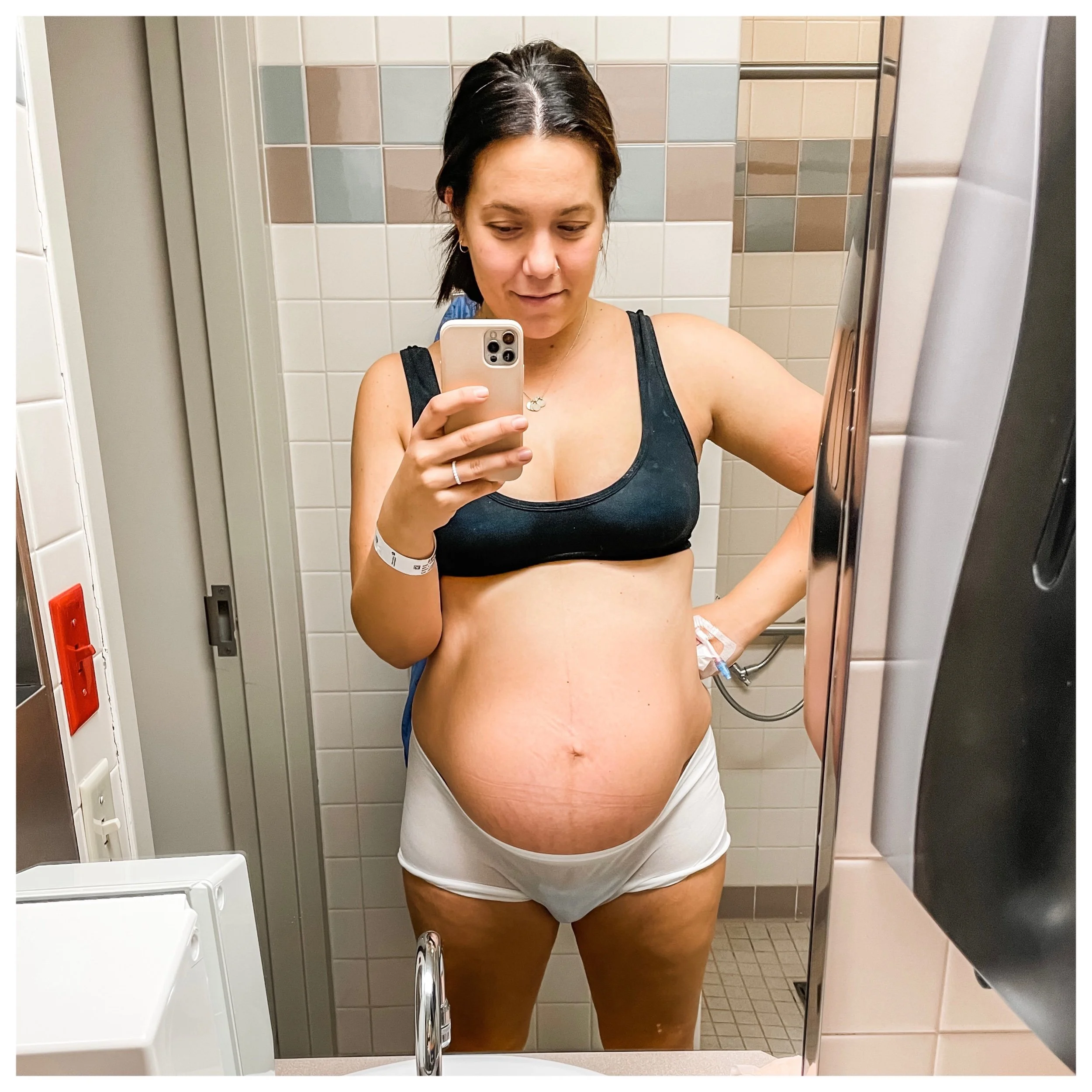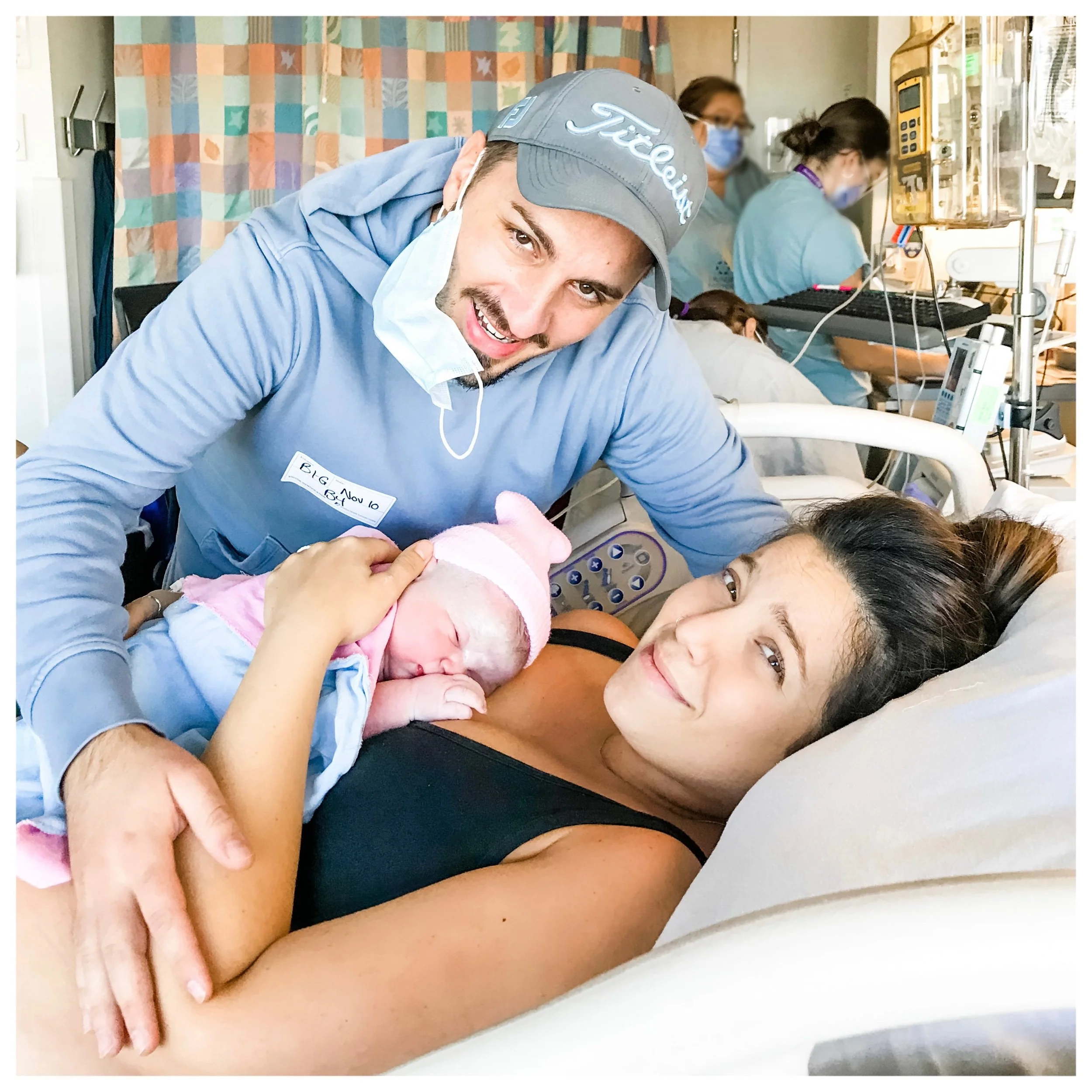NEW BABY NUANCES
The entire journey to baby is a trip. Even when you wanted this and genuinely love the experience as a whole, you are still bound to run into several major WTF moments. The absolute wildest part, is when the hospital sends you packing 24 hours later and just expects you to be fully capable of caring for this teeny little human. There are so many little nuances when it comes to newborns that nobody really tells you about. Probably cause most of the new parents navigating them barely have time to shower let alone write a public service announcement. And we’re just sent home… bleeding, exhausted, hormonal… and most likely at least a little bit terrified of the responsibility that awaits. And the (slightly horrifying) reality is, that new little burrito is a loot bag of surprises. Many of which can easily catch a new parent off-guard despite being (for the most part) entirely harmless. So after two babies, here’s a list of a few of the things we’ve encountered that we wish we’d of known not to panic about…
Are they breathing?
This is Parent Initiation 101. Be prepared to spend the first few weeks of their life absolutely terrified by every sound they do (or do not) make. A relatively new practice after baby is born, is to not suction out their nose and mouth. If baby has clear amniotic fluid and is breathing in their own, suctioning is deemed unnecessary as it can potentially lead to complications such as a low heart rate and apnea. Sounds legit right? The only downside is that your baby will likely have some lingering amniotic fluid and mucus left in their body, and will spend the first few days of their life working it out. Which just makes them occasionally sound like they’re choking. You read that right. Let me tell you, there is absolutely nothing more terrifying for a new parent than that two seconds that feel like a lifetime after a baby gags, when their arms are flailing with a throat full of mucus and spit-up and they aren’t catching their breath. At least, you think nothing is worse… until a few days later when they’ve finally worked through all that leftover amniotic goodness and their breathing is… SILENT. I can’t emphasize that word enough, a healthy baby makes absolutely no sound when they’re fast asleep. So while they’re in la la land you’ll likely be wide-eyed touching their chest to feel for a heartbeat or putting your ear to their nose to make out a faint little breath. Think of it as a twisted right of passage into parenthood.
Spit happens… a lot
It’s pretty common knowledge that babies spit up, but what you may not be prepared for is just how much they do. That goes for frequency and volume. All babies are little individuals, which means they have their own nuances when it comes to things like feeding. Whether bottle or breast is the source, there will be a bit of a learning curve for both of you. This can occasionally result in an air bubble sitting underneath a hefty amount of milk and as you’re both working to get into a burping groove, that air bubble may push (or project) that milk up and out. To put it lightly… it’s startling. The volume, how far they project it, and especially if it happens when you’re laying them down at 3am. Aside from scary, it can feel defeating; you just fed them and now they seemingly spit up all your hard work. But don’t worry, it likely looks like much more than it actually is. Lou was diagnosed with GERD (gastroesophageal reflux disease, aka acid reflux) as a result of her esophageal sphincter being slightly underdeveloped. This meant she spit up ALL THE TIME. I tried lay-back nursing, she was on meds, we kept her upright endlessly after a feed… it didn’t matter. She just needed to outgrow it, which often doesn’t happen until they start eating solids or sitting up on their own. For Lou it was the latter. Alas, as all parents must constantly do, we adapted. We learned quickly to lay a waterproof mat on every surface before putting her down, lived with at least two Burts Bees Burp clothes on ourselves at all times (these are the absolute best, their absorbency is insane), and gave anyone wanting to hold her the disclaimer of “I hope that isn’t your favourite shirt”. With both babies I’ve had an overactive let down, which often results in baby getting mildly waterboarded at the start of a feed and making a gasping sound that strongly resembles a dolphin. We call it doing the Flipper. It just takes myself and baby time to get used to my flow of milk, their way of drinking, the best timing and tricks to burp them, etc. In reality, the only way you ever build up enough trust in yourself to know that they are breathing when you lay your head down at night, is by getting used to all their sounds.
Who invited Mr. Sandman?
So… you’re on day two(ish) of newborn baby bliss and you wake up greeted by the morning light, roll over to look at your beautiful new baby and there is a massive eye booger that’s a slightly threatening shade of yellow/green covering your baby’s entire eyelid. Panic. Surely this isn’t good, the greenish hue must mean an infection, and suddenly you’re on the phone with your paediatrician convinced by Google that your child is likely going to lose their eye. Breathe. This is actually incredibly common and (although it doesn’t look it) harmless. It just means your baby’s tear duct is underdeveloped and mildly blocked. Baby’s body is actually doing all the right things by trying to flush it out. Both my girls had this and would some days even wake up with an eye completely crusted shut. Whatever you do, don’t put your hands in their eyes trying to clean it off. A washcloth with warm water is all it takes to wipe Mr. Sandman away until your babe’s tear ducts are fully functioning.
Two words: baby, acne
Just when you’ve adapted to seeing your precious bundle with a crusty eye, you notice a few little red bumps on baby’s cheek. Thinking nothing of it… you give them a bath as per usual, swaddle them up for the night and wake up to the face of a pubescent teenager. I truly feel baby acne does not get enough screen time in this world, especially considering how many mom’s I know who’ve encountered it. Its theorized to be cause by a change in hormones (for mom and/or baby), and it’s startling for a lot reasons. First, you panic thinking your baby is having some sort of reaction. Then you panic thinking it’s something you ate or some sort of dairy intolerance (which is actually super rare). Then, as time goes on it appears to only get worse, so you start questioning the diagnosis. We must have brought it up to our doctor ten times, googled every possible home remedy, and one night even took Lou to an infant urgent care walk in clinic. We just kept getting the same answer; it’ll eventually go away on its own. I tried putting breastmilk on it. I bought the allusive Tubby Todd cream everyone in my mom groups mentioned and paid triple the price of the cream itself just to have it shipped. I tried putting nothing on it. I even eventually convinced my doctor to give me a prescription cream. Nothing worked. Anything I thought worked was just a temporary placebo effect, because the next day it wouldn’t work. The truth is, the only solution is the answer you got at first that you didn’t want accept; it’ll eventually go away on its own. It’s almost heartbreaking to see but it doesn’t hurt baby, it’s temporary and even though it’s hard to imagine their beautiful skin will be restored to its flawless self. Most importantly… there is nothing you can do about it, it just needs to run it’s course. Lou’s started at 5 weeks old and lasted about a month, while Andie’s started at 3 weeks and is still going strong. Once again… this too shall pass.
Hold the cheese
While your sweet little babe is fermenting in your amniotic fluid during your third trimester, their body produces a substance called vernix caseosa. This acts as a protective layer on babies skin while they’re in the womb and bits of it will likely remain present on baby’s skin after birth. It’s the thick, white-ish, cheesy looking stuff. In the past it was quickly washed off in baby’s first bath at the hospital. But, although it may not look appealing, it has incredible anti-microbial properties that are so beneficial to your little newcomer. Among many things it moisturizes baby’s skin, helps regulate their body temperature, and even helps them develop a stronger immune system. For this reason (and many others) newborns are not given a bath in hospital and it’s actually recommended for them not to be bathed at all for the first few days. Tip: this also helps that pesky umbilical cord dry up, fall off, and heal quickly. These are all great things for baby, however, I have one disclaimer… check your baby’s cheese pockets. After you do eventually bathe them, little deep grooves and folds of their wrinkly skin can easily deceive you into thinking baby is squeaky clean. But those pockets can hold remnants of the vernix caseosa, lint, sweat, milk, spit-up, etc. and it doesn’t take long for that magical new baby smell to start resembling that of an aged cheddar. The usual suspects I’ve found are: between each finger and toe, behind the ear, under the chin/neck, deep in the armpits and (this was a new one for me) behind the knees. Andie’s healthy rolls had me cleaning every crevice and not even thinking to look behind her knees. By the time I discovered it her poor skin was so irritated (heavy mom guilt). So check your baby regularly in the early days and trust me when I tell you, the pockets are almost always deeper than you think.
Girls rule. Period.
This one only applies if you’ve recently welcomed a baby girl. Newborn girls experience quite the hormonal shift after being born (a cruel bit of foreshadowing), with the biggest being a cut-off from Mommy’s estrogen levels. This actually results in baby girl getting what’s known as a false period. First baby acne and now this. It can appear in the form of some light spotting or thicker discharge, and usually happens I think the first week or so of their life. It’s completely normal and absolutely no cause for concern, which is why… we should probably talk about it! Seeing blood in your baby’s diaper without being prepared with the knowledge of what’s causing it, is a recipe for a full-blown Dr. Google meltdown. Plus, what the hell? They’re a mere day or so old and we’re already conditioning them to not respect the functionings of their incredible female bodies? I don’t like to point fingers, but I blame the patriarchy for this one.




